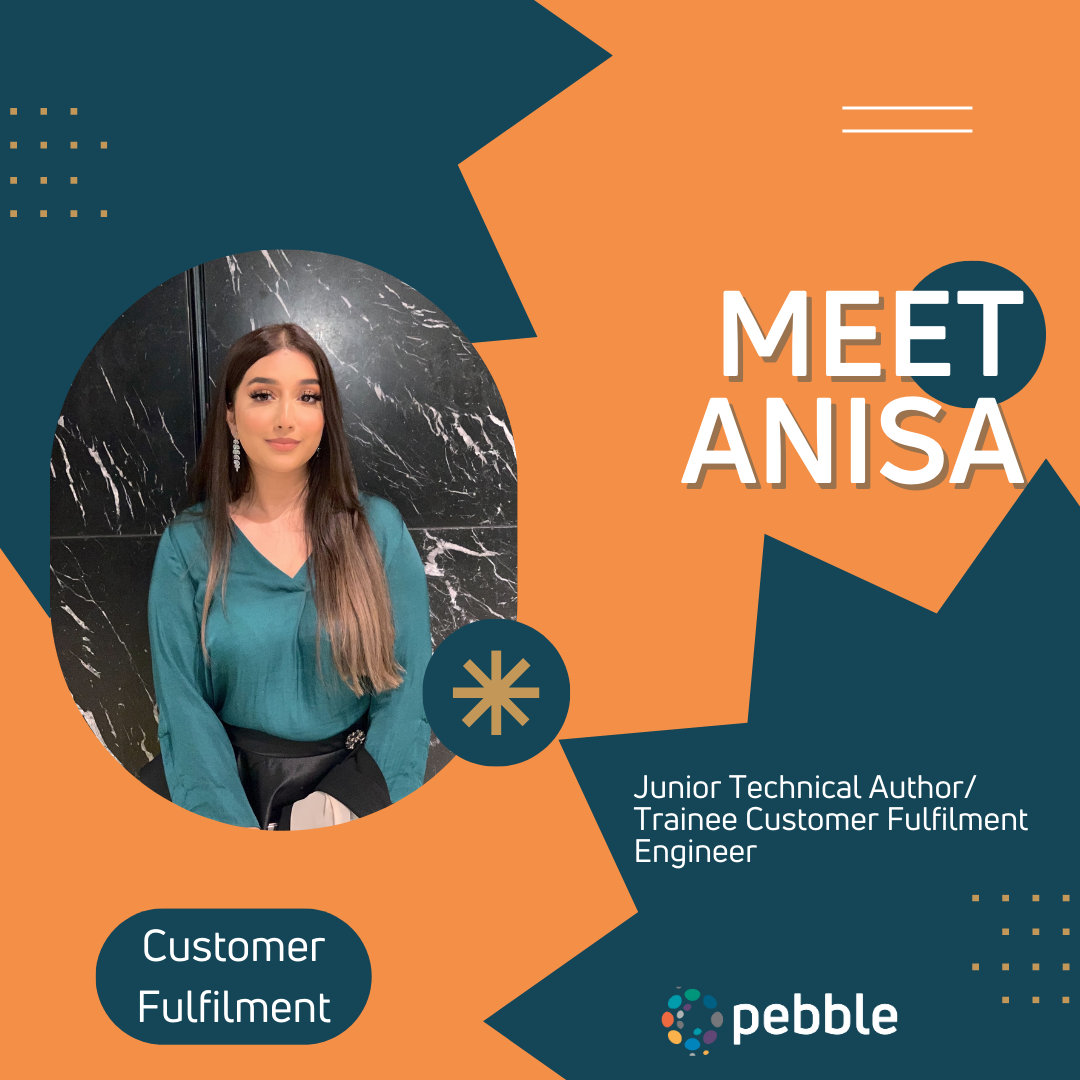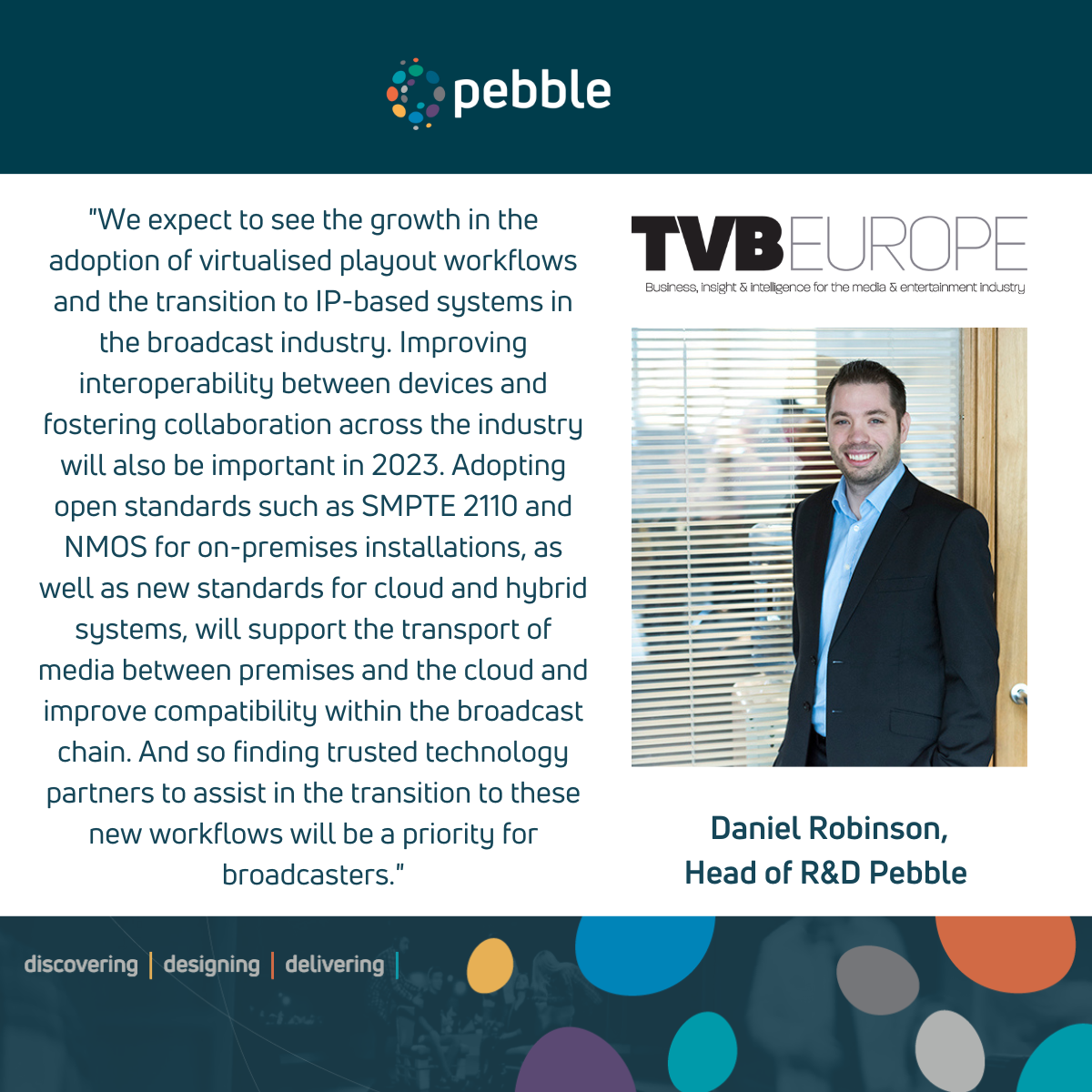Anisa Khan featured in TVBEurope’s “Meet The” Series where they talk to a range of people working within the media and entertainment industry about their average working day in their roles. The piece can be found online here.
Talk us through an average day in your role
With my Customer Fulfilment Engineer hat on, I begin the day accessing our customers’ sites via a VPN connection over the internet and working on their playout systems. My remit here is installing Pebble Automation – our playout automation software – and configuring components that will help our customers run their TV channel. It’s a really varied role where I work on very different types of content day to day – I could be working on a news channel one day then on a sports one the next! There are so many different things to be aware of and consider when it comes to running a TV channel, but mainly my role is around configuring devices, testing connections and making sure every device ‘speaks with each other’ correctly and that every part of the workflow runs smoothly together so that a customer’s channel stays on air.
As a Junior Technical Author I initially worked exclusively on our documentation for a year where I was involved in the rebranding of internal and external documentation (since Pebble had undergone a brand refresh in October 2020) and updating feature guides, operation manuals, and configuration guides. I still work on updating documentation and also update Confluence pages whenever there is a software update or a change in how something works technically. I spend a lot of time talking to developers or someone who has the knowledge around the relevant update and then I write it up. This means the update has been formally documented and can be easily found by my colleagues in the future.
How did you get started in the media industry?
Word of mouth! I was advised that Pebble were looking for new entrants to help with their documentation updates. I graduated in 2020 during the pandemic, had already decided that I didn’t want to take up a career in Bio-Medical Sciences – which is what I had been studying. Nonetheless I still finished the degree, thinking that maybe I could go into a tech role instead. I had an interest in coding as I had seen a lot of promotion aimed at young women getting into coding whilst I was studying at university. When I found out that Pebble was a software company working in broadcast it piqued my interest. A Technical Writer role was available and it looked like I didn’t need a background in computer science or media. It was a great first role to get into because I had a lot of experience during my studies in writing lab reports and literature reviews, as well as having recently written my dissertation. So I jumped at the chance of this thinking I could potentially get into coding – but have instead started working on the engineering side and working at customer sites both remotely and in person, which has been so brilliant and interesting!
What training did you have before entering the industry?
I have been learning on the job! Obviously the skills gained whilst studying has been really helpful with my Junior Technical Author role, but as a Trainee Customer Fulfilment Engineer I have thrown myself in learning as I go. I have had such an incredible amount of support from more experienced colleagues along the way which has been really helpful as I navigate my way into working on the engineering side.
Why do you enjoy working in the industry?
Because I am learning about an industry that really fascinates me. Each and every day I learn something new about the technicalities of running a TV channel. I never thought I’d end up doing something like this. Growing up as a child of the noughties and particularly as a teen in the 2010’s, I have seen a very rapid changeover of how technology has advanced. For that reason I have always had a keen interest in technology but never really considered it as a career initially. It’s made me realise how tech jobs were poorly marketed whilst I was at school/college. It was only as I went to Uni that a tech role seemed like a feasible route, with initiatives like Women in STEM and Women in Tech being talked about more and more. Going from potentially wanting to be a coder to actually being a TV engineer, I really enjoy the fact that I see the behind the scenes view of the industry and I get really excited by this! When I first started learning about what it means to work in a broadcast engineering role I thought “Wow this is how to run a TV channel?! I am getting the inside scoop of how it all works!” I get to see servers, TX rooms as well as gaining hands on experience of working on with playout automation software. When I used to hear about people working in media I only thought about journalists or presenters – it never occurred to me about the mechanics of keeping a TV channel on air and how viewers get to see the likes of a news journalist or TV presenter on screen because that was never shared, or at least I was never exposed to this being a possible career choice.
What piece of advice would you offer someone looking to explore a role similar to yours?
Be curious. And the soft skills are so important – being interpersonal, a ‘people person’, work on Be assured that working in broadcast doesn’t have a rigid structure and path to get into it – you can make what you want of it. In some ways I think it’s a good thing not to have a set out path because anyone with a passion for it can define their own way. I have learned that there are many different kinds of roles in the industry and you don’t need a media degree – obviously it would help and I still think it was beneficial for me to study a degree because I have been able to apply my learnings – just in a different way. The main advice I’d share is having a willingness to learn and work at it because the realm of broadcast is constantly evolving – you will never feel like you’re behind because everyone else is also adapting to the changing environment of broadcast technology. And for any young women looking to get into a technical role, please don’t be intimidated because I can honestly say that all of my male colleagues have been so helpful and supportive. Every single one of them has been willing to help me so that I have reached a point where I can stand on my own two feet and own my role as a Trainee Customer Fulfilment Engineer. And doing the ground work working as a Junior Technical Author has definitely helped me gain a better understanding of the technology used by our customers.



